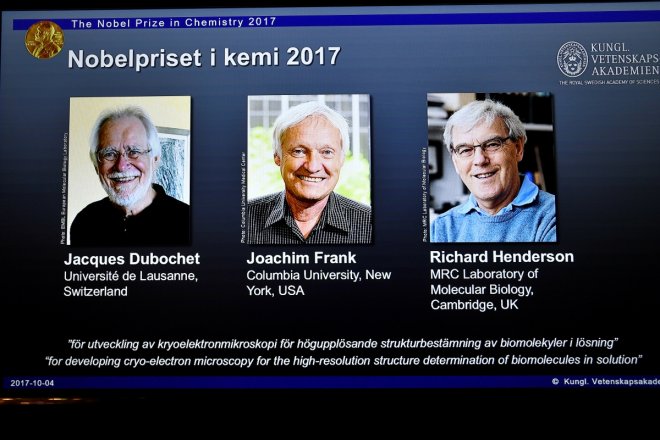
The 2017 Nobel Prize in Chemistry has been awarded to Jacques Dubochet, Joachim Frank and Richard Henderson for the development of the cryo-electron microscopy which both simplifies and improves imaging of the biomolecules.
The new technology is useful in taking the pictures of live bio-molecules by freezing them while in motion. This gives a rapid advancement in our study of bio-system in organisms and helps in the development of pharmaceutical research.
Over the years, several interesting facts have been associated with this particular Nobel Prize. Some of them are quite useful to know.
Number of Nobels
A total number of 108 Nobel Prizes have been awarded to 175 laureates in Chemistry since its inception in 1901.
The Chemistry Nobel Prize was awarded 63 times to single individual. It had been shared between two laureates for 23 times while 22 Nobel Prizes for Chemistry were shared by 3 persons.
According to Nobel Foundation, "A prize amount may be equally divided between two works, each of which is considered to merit a prize. If a work that is being rewarded has been produced by 2 or 3 persons, the prize shall be awarded to them jointly. In no case may a prize amount be divided between more than three persons."
Winners' Trivia
Only one person has received the Nobel Prize in Chemistry twice. Frederick Sanger was awarded the prize in 1958 and 1980. The award was given to 175 times to 174 persons.
Marie Curie is the only woman to have received the Nobel Prize twice. She had won her first Nobel Prize in Physics in 1903 along with her husband Pierre Curie. Marie Curie received her individual Prize in Chemistry in 1911.
The Curies' elder daughter Irene Joliot-Curie had her Nobel Prize shared with her husband Frederic Joliot in 1935. Henry R Labouisse, the husband of Irene Joliot's sister Eve Curie, received the Nobel Peace Prize in 1965 on behalf of the UNICEF.
Only four women have received the Nobel Prize in Chemistry. Marrie Curie and Dorothy Crowfoot Hodgkin were the only women among them to receive individual Nobel Prize.
Nobel Prize denials in history
The Nobel Foundation authorities forced two laureates to deny their prizes. Adolf Hitler had forbidden three Germans scientists from receiving the Nobel Prize. Richard Kuhn and Adolf Butenandt were awarded the Prize in Chemistry in 1938 and 1939 but had to refuse it due to Hitler's orders. Another German, Gerhard Domagk, was also awarded for Physiology in 1939, which he didn't accept.
Winners and their age factor
The average age for all Chemistry laureates to win an award is 58 years. Frederic Joliot was the youngest person to receive a Nobel Prize at an age of 35. John B. Fenn was the oldest person to be awarded the Prize for chemistry. He received the award at an age of 85 years in 2002. Most of the Nobel Prize winners had their birthdays in June.
The medal's design and designer
Swedish sculptor and engineer Erik Lindberg had designed the medal for Chemistry Nobel prize. It represents nature in the form of goddess Isis, emerging from the clouds and holding a cornucopia, which looks similar to a goat's horn, in her arms. The veil which covers her face is held by Genius of Science. The Nobel diplomas are designed by Swedish and Norwegian artists and calligraphers.
Nobel Prize money
The prize money is taken from the income from Alfred Noble's belongings, which is deposited in secret sources. The total prize money for 2017 is Swedish Kronor $ 9.0 million per category.
Nobel not awarded
It was not awarded on eight occasions: 1916, 1917, 1919, 1924, 1933, 1940, 1941 and 1942. Nobel Prizes were not awarded during the World War 1 and 2.
The Nobel foundation authorities stated that "If none of the works under consideration is found to be of importance indicated in the first paragraph, the prize money shall be reserved until the following year. If even then, the prize cannot be awarded, the amount shall be added to foundations restricted funds."









